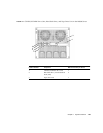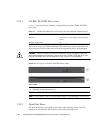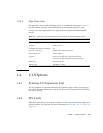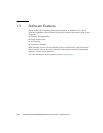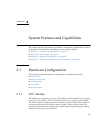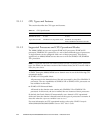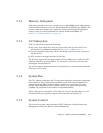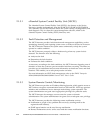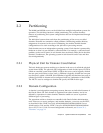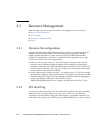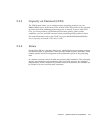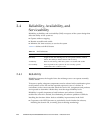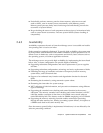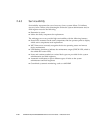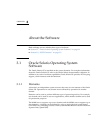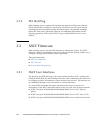
Chapter 2 System Features and Capabilities 2-5
2.2 Partitioning
The M4000 and M5000 servers can be divided into multiple independent systems for
operation. This dividing function is called partitioning. This section describes
features of partitioning and system configurations that can be implemented through
partitioning.
The individual systems that result from the partitioning of the server are called
domains. Domains are sometimes called partitions. Partitioning enables arbitrary
assignment of resources in the server. Partitioning also enables flexible domain
configurations to be used according to the job load or processing amount.
Each domain runs on an independent operating system. Each domain is protected by
hardware so that it is not affected by other domains. For example, a software-based
problem, such as an OS panic, in one domain does not directly affect jobs in the other
domains. Furthermore, the operating system in each domain can be reset and shut
down independently.
2.2.1 Physical Unit for Domain Constitution
The basic hardware resource making up a domain in the server is called the physical
system board (PSB). The physical unit configuration of each divided part of a PSB is
called an extended system board (XSB). A PSB in this server can be logically divided
into one part (no division) or four parts. A PSB that is logically divided into one part
(no division) is called a Uni-XSB, and a PSB that is logically divided into four parts is
called a Quad-XSB. A domain can be configured with any combination of these XSBs.
The XSCF is used to configure a domain and specify the PSB division type.
2.2.2 Domain Configuration
A domain is an independent computing resource that runs an individual instance of
the Oracle Solaris OS. Each domain is separated from other domains, and is not
affected by operations in other domains. Domains enable one server to perform
different types of processing.
The operations within a domain are controlled with Oracle Solaris administration
tools. However, to create, configure, and monitor domains, you must use the XSCF,
as described in the SPARC Enterprise M3000/M4000/M5000/M8000/M9000 Servers
Administration Guide and the SPARC Enterprise M3000/M4000/M5000/M8000/M9000
Servers XSCF User’s Guide. For more background on domains, see Section 3.1.1,
“Domains” on page 3-1.



